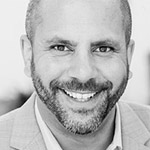Welcome to Mindfulness in Medicine, a monthly column by best-selling author Anne Bruce designed to cultivate leadership and collaborative relationships among hospital leaders, nurses, providers and ancillary staff. Mindfulness is a powerful leadership tool that enhances emotional intelligence in medicine. It is a tool that, when practiced, can help us develop and implement relational coaching skills and illuminate various ways to improve hospital operations and cross-departmental performance. Mindfulness also improves our capacity for decision-making and participatory medicine, all while enhancing our own health and well-being. Your comments and insights on these postings are greatly valued.
Anne Bruce has provided training and performance coaching for Vituity. She is also a bestselling author of more than 20 books.
In this month's column, Anne again welcomes Dawa Tarchin Phillips, the renowned expert on mindfulness and leadership. Last month, he shared some benefits of mindfulness as well as evidence for its effectiveness. Today, he offers practical suggestions for cultivating mindfulness as well as recommendations for ED leaders.
In the emergency medical field, the relationship between doctor and patient remains first and foremost a human relationship. To improve it, human factors have to be considered. Mindfulness can be the working basis for the relationship to yourself and your relationship to those around you, and therefore can have significant effects on the quality of your personal wellbeing, professional life, and impact.
Once you have identified the simple truth of what it is to be mindful, you can take next steps and develop a few simple disciplines that make being present easier and being mindful feel more natural.
- Dedicate a few minutes every day to cultivating mindfulness, consciously and by choice. Like compounding interest, it will pay you back handsomely over time. The value and benefit of five minutes of daily practice today grows exponentially, and the same five minutes will pay you back multifold over the period of one, five, or 10 years. Here is how to start:
- Connect with your physical sensations. Whether you are walking, standing, sitting or lying down, connecting with your physical sensations in the present moment not only grounds you, it also strengthens your empathy as the awareness of your own pleasant or unpleasant physical sensations lets you relate more directly and compassionately to the physical sensations and ailments of your patients.
- Sit or stand in an upright posture. Find a comfortable seat or posture that allows you to have a straight spine. A straight posture quickly translates into greater mental clarity and allows you to stay alert longer without dullness or drowsiness.
- Cultivate trust. Nothing distracts and clouds the mind like ongoing worry and anxiety. Choose to cultivate trust instead. You can do that by investing in your ability to be human and simply do your best, while not pursuing delusions of grandeur, denial of your own vulnerability or self-hatred for the inevitable array of our human imperfections.
- "Anchor" your attention. Focusing on your breath, your sensations, or simply a spot on the wall, will anchor your attention in the present moment for minutes at a time by returning again and again to the object of your training.
- Cultivate non-judgment. Also called openness or acceptance, it is the decision and ability to suspend dogmatic self-judgment on your own present mental and emotional state in regard to its cognitive value and instead to shift the focus on fully being with your own state, as it is.
- Cultivate kindness. Kindness can be summarized as the commitment to not abuse yourself or others for the sake of money, image or status, but to engage in big picture thinking that sees your own well-being and that of your patients as not in opposition but aligned.
Reality Check
Even though the costs and frustrations of dysfunctional doctor-patient relationships are significant for both parties, and the problem has been widely researched, there is still great need for simple, direct methodologies that emergency health care providers can integrate into their busy lives.
Research shows that mindfulness, a simple practice to cultivate focused attention, openness and non-distraction, can have significant impact on the real-life quality of the doctor-patient relationship.
Mindfulness also has been found to reduce the adverse effects of highly stressful professional environments, increasing perceived well-being, mood, cognitive function, resilience and sense of interconnection with others. It might therefore be of special value to invest in effective mindfulness-based training programs and expert-led training events that can begin to empower emergency physicians with tools to manage stress and cultivate presence, giving you the much-needed skills to improve your own well-being and effectively cultivate more satisfying doctor-patient relationships.
About the Authors
Dawa Tarchin Phillips is President/CEO of Empowerment Holdings, a leadership development and consulting firm that trains hundreds of professionals every year in mindfulness-based leadership and professional skills and interventions. Dawa is also a visiting Research Specialist at the Department of Psychological and Brain Sciences at UC Santa Barbara and the founder and Executive Director of The Institute of Compassionate Awareness (TICA). You can read more about Dawa's work at www.empowermentholdings.com, and you can email him at dtp@empowermentholdings.com or phone 805-680-3988.
Anne Bruce has provided training and performance coaching for Vituity. She also serves as MBSI's Employee Development Coach and Leadership Facilitator. Anne is a bestselling author with more than 20 books published by McGraw-Hill Publishing, New York. She considers her award-winning life-coaching book, Discover True North: A 4-Week Approach to Ignite Passion and Activate Potential (McGraw-Hill Publishing) to be one of her most "mindful" books to date. She also leads a popular Discover True North Expedition group on LinkedIn. Anne can be reached at 214-507-8242 or by writing to her at Anne@AnneBruce.com.























